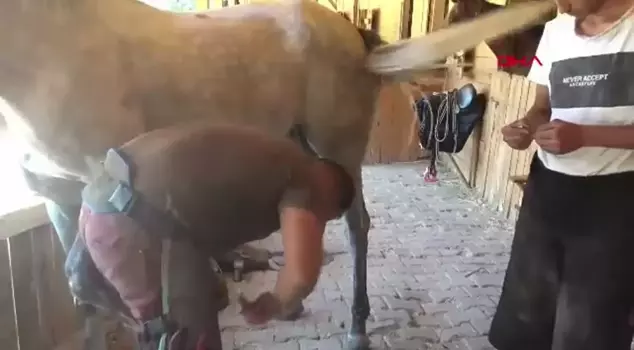
04.09.2024 10:21
Özkan Yeşilçay, who is an instructor at Karabük University, practices farriery in his spare time. Yeşilçay, who expressed his desire to pass on this profession to young people, said, "It has a very comfortable monthly income of 50-60 thousand lira."
Özkan Yeşilçay (38), an instructor at Karabük University Eflani Vocational School of Horsemanship and Horse Coaching Department, practices the profession of a farrier in his spare time. Yeşilçay hammers horseshoes in Bolu, Karabük, Düzce, Kastamonu, Istanbul, Ankara, Eskişehir, and Bilecik.
Yeşilçay, who stated that he is trying to pass on the profession of farriery, which has lost its popularity, to the younger generation, said, "Our farriers earn more than 100 thousand liras per month. I can't go out much because I work in the public sector, but still, it has a very comfortable income of around 50-60 thousand liras per month."
Farriery, which was one of the most popular professions during the period when transportation was provided by horses, is now on the verge of being forgotten. Nowadays, only a few masters continue to practice farriery.
'WE TRAIN THEM AS FARRIERS'
Yeşilçay, who teaches at the university, stated that they direct young people towards farriery and said, "Our enthusiastic friends come to study coaching, but those who have an interest and have done some farming in the past can choose farriery. We train them as farriers."
'I HAVE ALMOST ALL OF WESTERN BLACK SEA REGION'
Özkan Yeşilçay, who occasionally goes to almost all of the provinces in the Western Black Sea region to hammer horseshoes, said, "I have almost all of the Western Black Sea region. I am the only one who does it professionally. I can go as far as Safranbolu, Karabük, Bolu, Düzce, and Istanbul. I can also go to Ankara and Eskişehir. When I go to Eskişehir, I try to go to Bozüyük and Bilecik as much as possible. I already have my friends who went to school there, in Eskişehir and Bilecik. We try to guide each other as much as we can."
'IT REQUIRES A LOT OF PHYSICAL STRENGTH'
Talking about the difficulties of the profession, Yeşilçay said, "The biggest challenge of the profession in the summer is flies. They bother the horses incredibly and make us very uncomfortable. Since the horses don't stop, they also bother us. So we can't work as we want. But because horses are naturally timid and because they are prey animals in nature, they need to be tamed a little. It really requires a lot of physical strength. Because we work by holding the front leg of the horse between our legs and the hind leg in our lap. We don't work in the old-fashioned way. In the past, one person would hold the leg while the master worked. Now we hold it ourselves and work ourselves. That's why it requires a lot of physical strength. It puts an incredible burden on the waist and legs."
'IT IS IN GOOD CONDITION AND DEVELOPING'
Yeşilçay, who stated that farriery is on the verge of being forgotten but has been developing in recent years, said, "It is one of the leading professions that are on the verge of being lost. It is developing slowly now. Let's not compare it with Europe. If we compare it with Europe, we are far behind. But horse racing is at a very good level in Turkey because of the races. Our horses that come out of the races are used in equestrian clubs. It is in good condition now and developing. They used to use it for transportation, now they use it for pleasure, riding, and enjoyment."
'OUR FARRIERS EARN MORE THAN 100 THOUSAND LIRAS'
Özkan Yeşilçay, who said that professional farriers can earn more than 100 thousand liras per month, said, "If you can do farriery in a truly professional and good way, you can have very good incomes in Turkey if you establish yourself. Our farriers earn more than 100 thousand liras per month. I can't go out much because I work in the public sector, but still, it has a very comfortable income of around 50-60 thousand liras per month, after covering our expenses. Because our materials mostly come from abroad. Our horseshoes have been produced in Turkey for the past 2 years."